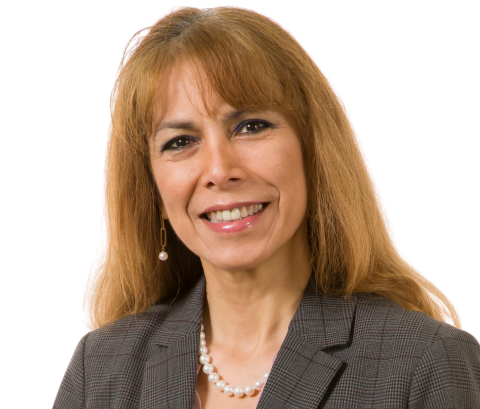
Photo by: Rowan Metnzer
Ranjita Raghavan, MD, has always looked for interesting, creative challenges. While in medical school at the University of Southern California, she took classes in aerial arts, mastering the hoop and silks. For a chance to live on the East Coast, the native Californian matched for an Emergency Medicine residency at Mount Sinai in New York City.
And seeking a challenge post-residency, this fall she was accepted as the inaugural fellow in UCSF Fresno’s new Global Emergency Medicine Education Fellowship (GMEd).
The one-year fellowship is an advanced training program for teaching Emergency Medicine in countries where Emergency Medicine (EM) is a developing specialty. It is a collaboration with the UCSF Fresno Department of Emergency Medicine and EM:RAP, a monthly education podcast focused on Emergency Medicine and a part of the Access and Innovation Medication Education (AIME) Collective.
The fellowship has a secondary focus of improving teaching skills for the fellow, drawing on workshops and expertise of EM:RAP educators, as well as providing teaching mentorship for international colleagues.
Dr. Raghavan was drawn to the fellowship for several reasons, including its emphasis on teaching and the ability to build on skills she gained during residency. In her third year of residency, she came to UCSF Fresno for a Medical Education Elective and she also was able to work on a few EM:RAP podcasts. “They were short segments, but it was fun,” she said. She also produced podcasts with the Emergency Medicine Residents Association (EMRA). “I was one of their podcasters for two years and it was amazing. We produced podcasts and learned from the podcasting greats.”
Her background in performance arts also lends itself to finding innovative ways of disseminating EM information globally. “I definitely want to take some of those skill sets and use them to produce EM content in an interesting format,” she said.
She has a passion for teaching, said Ryan Ernst, MD, a UCSF assistant clinical professor of Emergency Medicine and the UCSF Fresno director of Global Health Education. “She brings her online talent … and she brings her enthusiasm and talents to provide high-quality Emergency Medicine education internationally and to help curate existing relationships and help to develop relationships.”
She also thrives on learning. She had no experience in aerial arts when she stumbled upon a class in a gym and decided to sign up. “Once I find something interesting, I find people who do it really well and learn from the best,” she said. In a competition in Las Vegas, she took fourth place in the non-professional category for her age group in hoop and silks.
Dr. Raghavan’s proclivity for diving into new assignments fits with being the first Global Emergency Medicine Education Fellow at UCSF Fresno. She is tasked with numerous projects, including editor of EM:RAP GO newsletter and module director for the EM Diploma at Cho Ray Hospital in Ho Chi Minh City. She also is supporting both virtual and online teaching for the EM diploma at Aga Khan residencies in Nairobi, Kenya.
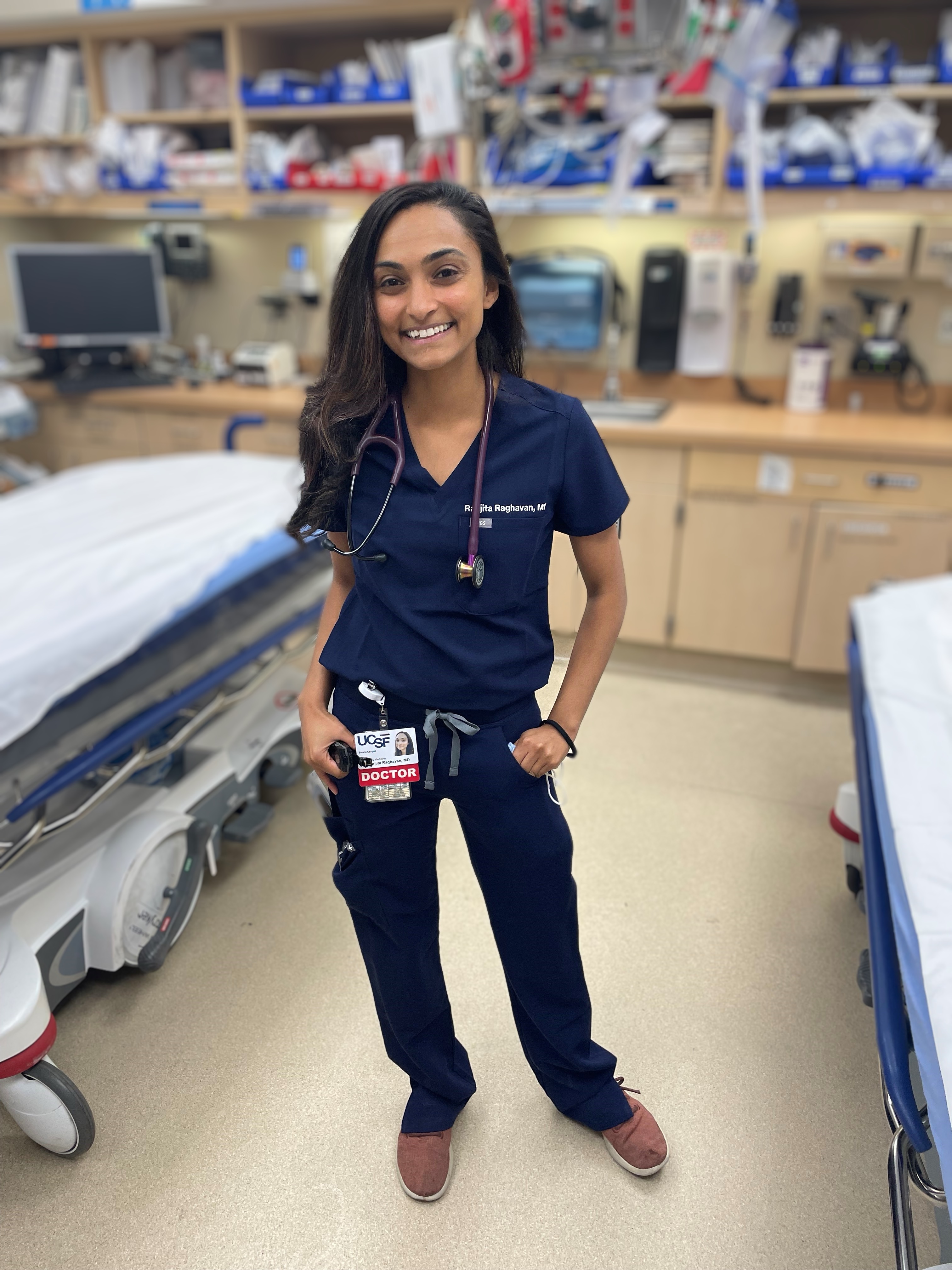
“I want to highlight global voices who have so much experience and maybe don’t have the outlet to share their knowledge. We can promote them and be able to learn from them as well, while helping them make a strong residency program,” she said. “One of the main things that Ryan (Dr. Ernst) and I want to highlight is that this is an anti-colonial agenda, and we achieve this with long-term commitment, flexibility and humility.”
While the UCSF Fresno fellowship allows her to further develop her teaching skills, it also provides clinical opportunities. Dr. Raghavan has an appointment as a UCSF clinical instructor and works in the emergency department at Community Regional Medical Center, while collaborating on global projects.
“I want to become a better educator, but I still want to work in the emergency department. Definitely working in this ER was a huge pull to come here. There are really diverse and sick patients. It’s a good feeling to know you are helping people who need it or people who don’t have access to care.”
Most of all, Dr. Raghavan is excited by the possibilities for developing long-term longitudinal educational collaborations across the globe during her fellowship year at UCSF Fresno.
“This Emergency Medicine Education Fellowship at UCSF Fresno really is honestly a golden ticket of a fellowship if you are interested in becoming a good educator and you want to get better clinically or like to continue your clinical skills. And you have this global agenda where you get to meet people from around the world and you get to learn from them – and you get to help them in a responsible way.”
Gender-Affirming Care Enhances Training at UCSF Fresno, Improves Patient Care and Public Health
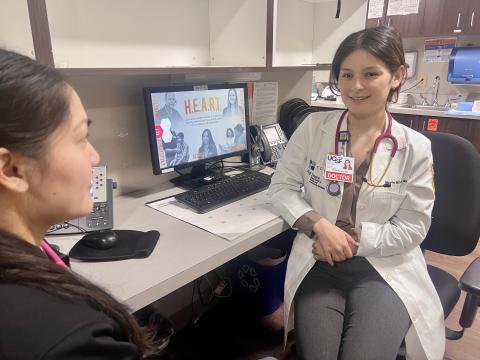
An academic environment and the ability to provide full-spectrum medical care to underserved communities are aspects that attract resident physicians and faculty to the UCSF Fresno Department of Family and Community Medicine.
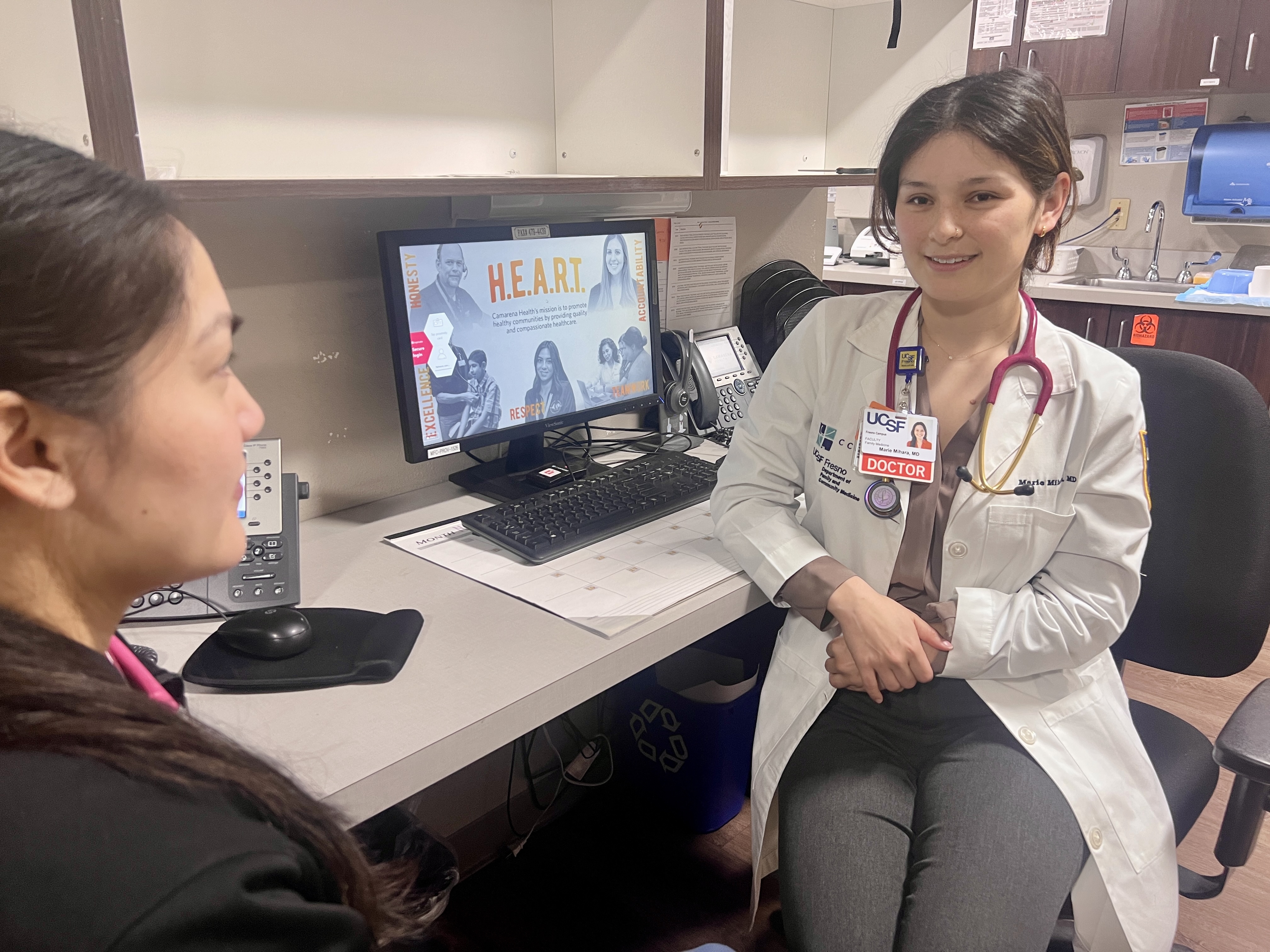
“We can take care of people truly from cradle to grave, that’s why I chose Family Medicine because I wanted to take care of patients before birth all the way to the end of their life,” said Marie Mihara, MD, who graduated in June 2023 from the UCSF Fresno Family and Community Medicine Residency Program and stayed in the department as faculty. Dr. Mihara who cares for patients and supervises residents at Camarena Health’s Sixth Street Health Center in Madera, added, “There aren’t very many places that you can do full spectrum both learning and developing skills on your own and immediately apply them to teaching.”
Full-spectrum care involves prenatal care, delivering babies and ongoing care for patients throughout their lives. As a result of growing interest, mentoring and new training opportunities and increased need, full-spectrum care provided by faculty and Family and Community Medicine residents at UCSF Fresno now includes gender-affirming care, a range of medical treatments and other support that validates and affirms a person’s gender identity.
“The partnership between UCSF Fresno Family and Community Medicine and Camarena Health enhances patient care at the community clinic level by infusing fresh perspectives and updated medical knowledge in order to provide quality and compassionate care,” said Mireya Samaniego, MD, Associate Medical Director, Camarena Health. “Residents’ exposure to diverse medical cases during their training strengthens the clinic’s capacity to address a wide range of health issues in our patient population.”
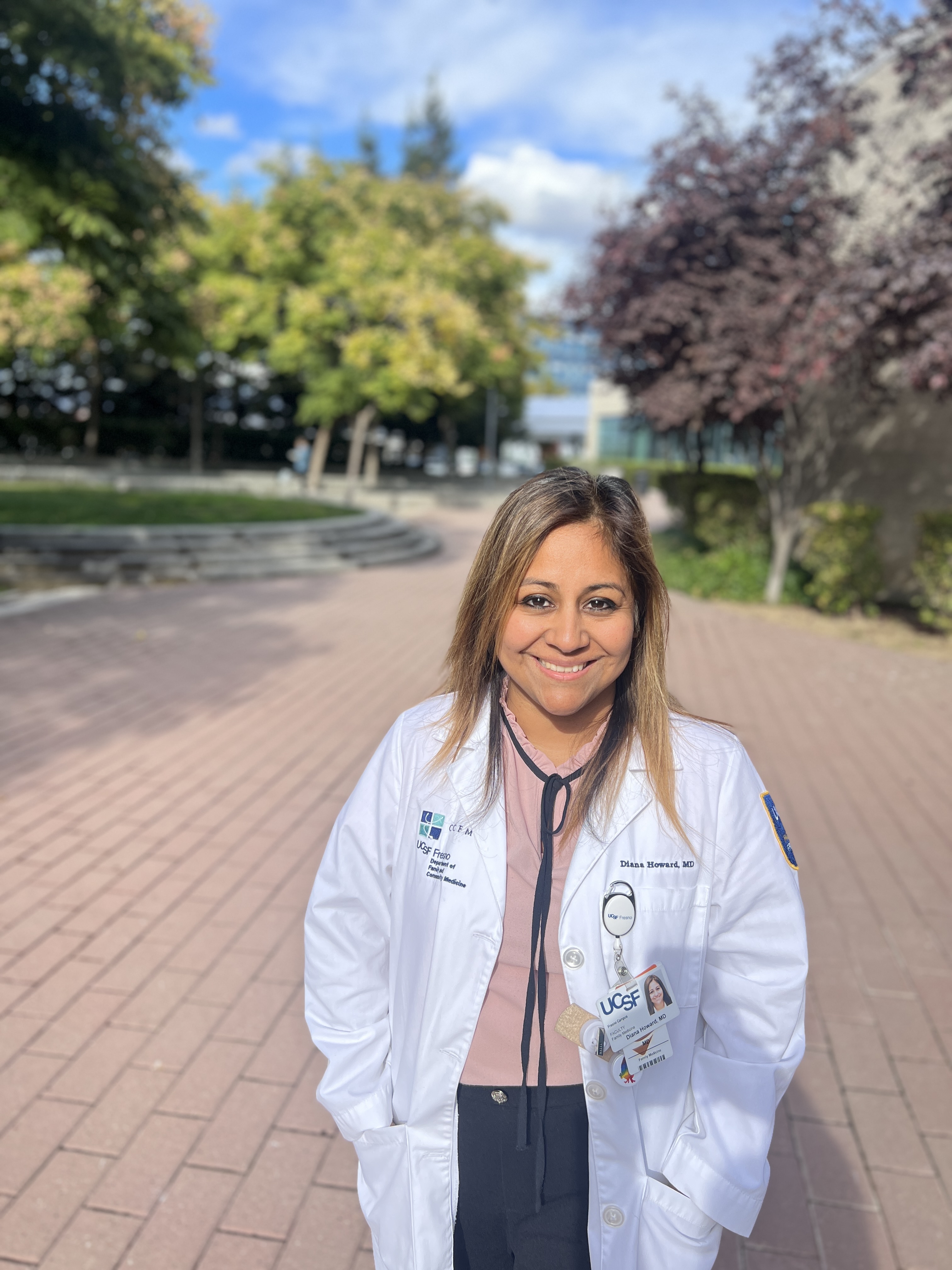
Diana Howard, MD, who graduated last year from Valley Health Team’s Family Medicine Residency Program and joined the Family and Community Medicine faculty at UCSF Fresno, echoed sentiments about providing full-spectrum care, particularly for transgender patients. Dr. Howard, who was born in Peru and is fluent in Spanish and French, sees patients and supervises residents at Family Health Care Network’s Ambulatory Care Center in Fresno. She also works two days a week at FHCN’s Specialty Services Clinic which houses the Ryan White HIV/AIDS Program.
“Being able to provide gender affirming care and also primary care to my transgender patients makes me feel that we are going to close the gap that we have. The gap not only for access but also the gap that we have in culturally competent physicians. I feel like I can have a double impact because I am also training residents,” said Dr. Howard.
According to Out 4 Mental Health’s Fresno County info sheet, more than 50% of transgender individuals reported their health care providers lacked knowledge specific to them. In addition, 28% of transgender and gender non-conforming people have delayed needed medical care due to concerns of discrimination.
For many years, access to gender-affirming care in the greater Fresno area was limited. But the number of local physicians who are now providing such care is growing. Drs. Mihara and Howard are among them.
“UCSF Fresno Family and Community Medicine prioritizes training in and the delivery of full-spectrum care, including gender-affirming care, to all in our community,” said Ivan Gomez, MD, chief, UCSF Fresno Department of Family and Community Medicine. "That priority includes developing and supporting innovative and relevant medical education training curriculum that is critical to targeting specific interventions for improving gender-affirming health care education for family physicians, particularly in our underserved communities.”
Training physicians to work in multi-disciplinary teams to provide high quality, accessible and culturally appropriate medical care is a priority across UCSF Fresno departments. Both Drs. Howard and Mihara point to Julie Nicole, MD, volunteer clinical faculty member in the UCSF Fresno Department of Obstetrics and Gynecology, as a mentor. Dr. Nicole, a longtime local expert in gender-affirming care, offers elective rotations for residents at her private OB-GYN practice in Clovis.
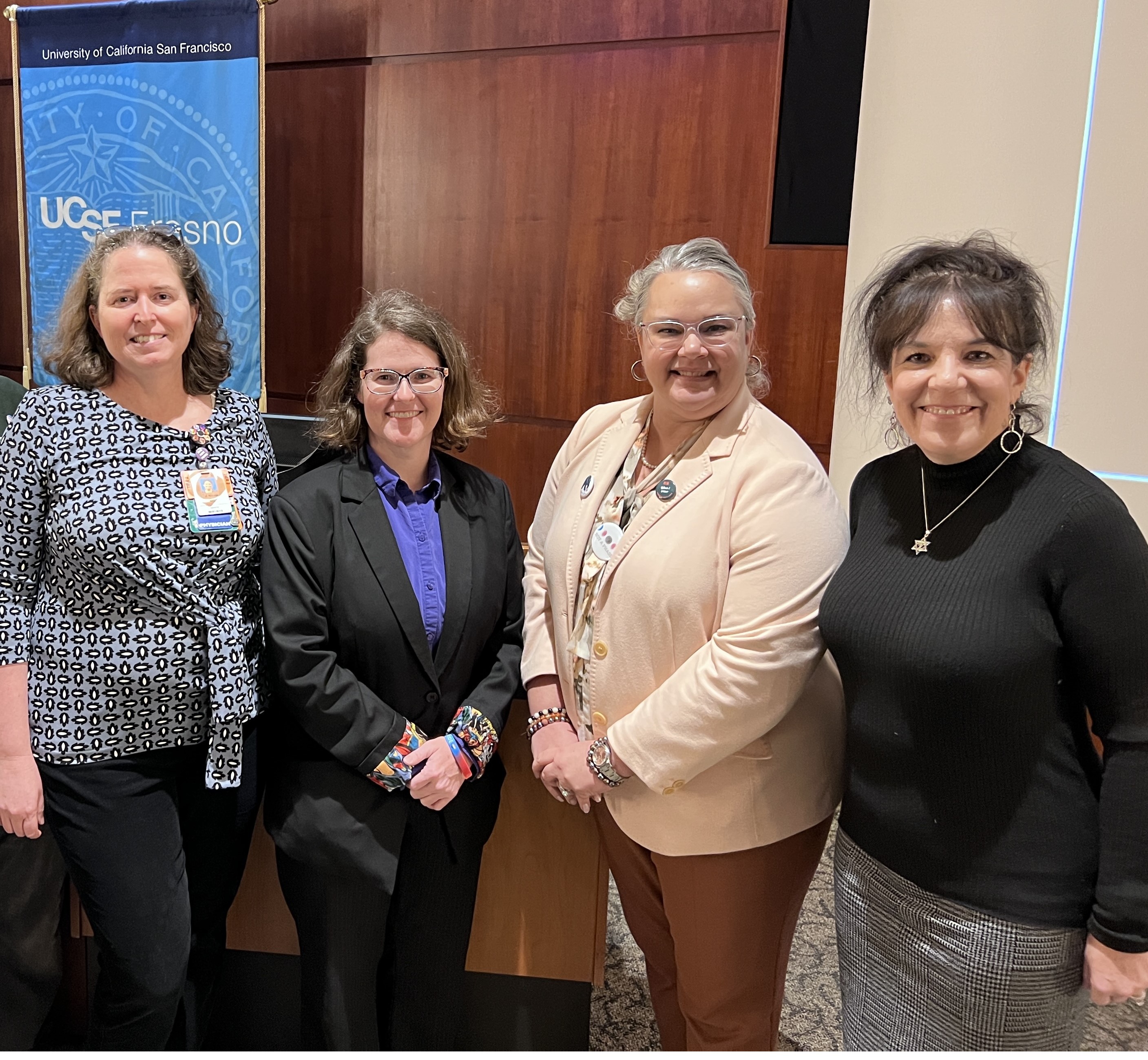
She is humbled to serve as inspiration for others and acknowledges that there is a purpose to her efforts. “For the longest time I was alone in Fresno providing that care outside of Planned Parenthood. And when you mentor someone, it's a little bit to work yourself out of a job and it's not that I'm planning to retire anytime soon. But it was very important for me to not leave the community behind when I want to retire. I really wanted to work on an infrastructure.”
Dr. Nicole is a certified mentor by the World Professional Association for Transgender Health and encouraged Dr. Howard to complete WPATH certification. Dr. Howard has an additional certification in HIV medicine.
Today, in addition to Drs. Howard, Mihara and Nicole, there are a handful of physicians in and around Fresno who are trained in gender-affirming care. Many of them were mentored by Dr. Nicole. In certain cases when a multi-disciplinary team is needed, patients are referred to UCLA, Stanford or UCSF.
“We're really working on improving access. I strongly believe that gender-affirming care belongs with primary care. I'm a specialist. I'm an OB-GYN, so I am not always in the office. There are some days I'm on labor and delivery. There are some days I'm in the operating room, so that makes it even harder for patients to come and see me,” said Dr. Nicole.
Primary care physicians are vital to the delivery of gender-affirming care and full-scope medicine that addresses patients’ preventive and other health care needs.
“While I do offer medical/hormone therapy, it is important to note that gender affirming care is much more than just medication or surgery. It encompasses a range of social, behavioral, psychological, and medical interventions,” said Dr. Mihara. “Gender affirming care saves lives. Affirming care decreases depression, anxiety, and most importantly decreases suicide risk. Everyone deserves to feel safe with their primary care physician.”
A 2020 California Healthcare Foundation report shows there are 47 primary care physicians in the San Joaquin Valley per 100,000 population. The recommended number is 81 per 100,000. In a region where primary care physicians and specialists are in short supply, the need for physicians who can address the health concerns of transgender patients is crucial. UCSF Fresno is partnering with health systems serving this population and local experts to train culturally competent physicians and expand access to care.
For years, parents have taken their children to sleep clinics for answers as to why their sons and daughters are sleepy during the day, when by all appearances they fall asleep quickly at bedtime and sleep until the morning.
The only difference these parents observed in their children’s sleep was a pronounced twisting and turning throughout the night.
“Parents would say, ‘he sleeps like a helicopter, or he sleeps like a fish, moving all over,’” says Lourdes DelRosso, MD, PhD, MS, a UCSF Fresno pediatric sleep specialist, program director of the UCSF Fresno Sleep Medicine Fellowship and UCSF professor of Family and Community Medicine.
It was parental descriptions of children’s sleep behavior that prompted Dr. DelRosso to investigate and participate in a pilot children’s sleep study six years ago at UCSF Benioff Children’s Hospital in Oakland. The study would lead to identification of “restless sleep disorder in children,” a new sleep syndrome and an explanation for the near-constant movements during sleep of some children.
Following the publication of the pilot study in the Sleep Journal, Dr. DelRosso co-chaired a task force with experts from South America, Europe and the United States. The task force looked further at evidence of what had previously been described with restless sleeping children and concluded that children with other disorders, such as asthma, could appear to be restless but all agreed that restless sleep disorder was its own entity.
The international group of researchers published the diagnostic criteria for restless sleep disorder: the child must have at least five movements per hour; have no other medical or sleep disorders; and have some daytime sleepiness.
Dr. DelRosso says the research also showed children with restless sleep disorder had iron levels that were on the low side of normal (although not necessarily low enough to be anemic). “And what was amazing is when we supplemented iron, either orally or intravenously, they slept better,” she says.
Since the pilot study, Dr. DelRosso says there have been more than 20 publications from researchers in the United States and Europe who have confirmed the presence of restless sleep disorder and its association with daytime sleepiness and with attention deficit hyperactivity disorder (ADHD). Several groups now are working on whether there is restless sleep disorder in association with parasomnia (sleepwalking) and if there is an association with children who have seizure disorders. And most importantly, the research is looking at the association of iron deficiency with other sleep disorders.
“This has pretty much changed the field of pediatric sleep disorders, because it has contributed to adding another player to improving sleep in children,” Dr. DelRosso says.
About 7.7% of children referred to sleep clinics have restless sleep disorder and 10% have restless legs syndrome, which is the urge to move the legs usually at bedtime.
However, children referred to sleep clinics are not representative of the general population (there are long waits to be seen and costs associated that restrict access), and much more needs to be known about the prevalence of restless sleep disorder in children, Dr. DelRosso says.
Important questions remain, such as how many school-age children are having frequent movements in sleep and need to be evaluated. Dr. DelRosso is working with pediatricians in Fresno to develop a questionnaire that could identify restless sleepers and bring them to the care of a sleep provider.
There also is more to study about the role of iron deficiency in restless sleep disorder. “It’s very likely not a single cause, but a conglomerate of situations that predispose a child for having restless sleep disorder,” Dr. DelRosso says. “However, we have been extremely successful with iron supplementation. It’s just amazing the response to iron supplementation, either oral or IV, it is overwhelming in children.”
Specific to Fresno, she would like to inquire and research the prevalence of restless sleep disorder in the large Latino/a/x population, specifically looking at iron deficiency in the brain and maybe actual iron deficiency anemia in the children. Dr. DelRosso sees patients at University Sleep and Pulmonary Associates, her faculty practice site.
“As a pediatric sleep doctor, I want to put all the tools together for children to succeed in school, to succeed in their projects, to succeed in sports – in everything they want to do – and give them a foundation for success in the future.”
UCSF Fresno Family Physician’s Goal is to Make Health Care More Accessible to Student Athletes
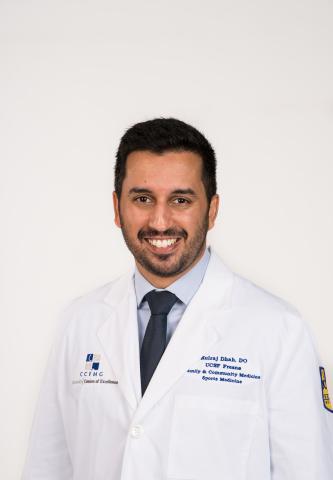
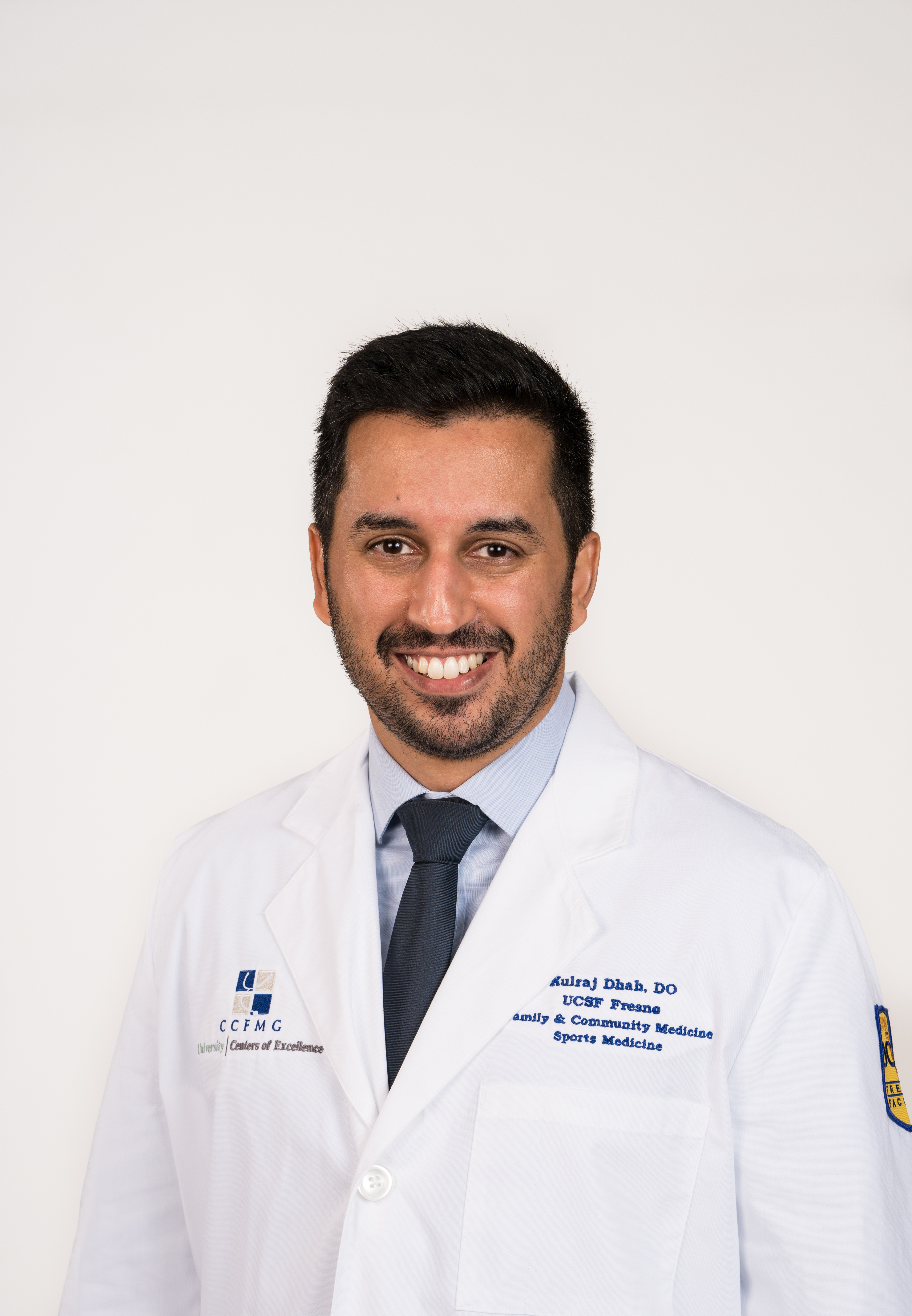
Growing up in Fresno, Kulraj Dhah, DO, played soccer, basketball and baseball. Like many athletes, he had the occasional sports injury, and he particularly recalls a broken finger requiring a trip to the Emergency Department. The hospital visit is a vivid memory because he seldom saw a doctor for ailments, relying on care at home because his family could not afford health insurance.
Now, Dr. Dhah is a UCSF Fresno Family and Community Medicine physician with a Sports Medicine specialty, and his priority is making health care more accessible to student athletes, regardless of family insurance status.
Dr. Dhah gives free sports physicals for high school athletes to be able to play. He volunteers on the sidelines at McLane High School football games. He is the volunteer physician for Reedley College’s football team. He is the sports medicine consultant for Central Valley Fuego, the professional soccer team here locally. And he provides care at three sports medicine clinics in Fresno that he created to help students who have Medi-Cal, the state-federal insurance for people of low-income.
“It was only if it was an absolute emergency when we saw a doctor growing up. So, coming back and doing Sports Medicine, I felt I could help my community and provide services for many who do not have access,” he says.
Dr. Dhah developed an interest in Sports Medicine at osteopathic medical school at A.T. Still University in Arizona. While completing Family and Community Medicine residency at UCSF Fresno, he pitched an idea of a sports medicine clinic, and returning to UCSF Fresno as a UCSF assistant clinical professor in 2019, he created a Sports Medicine Clinic at Family Health Care Network (FHCN).
FHCN is a federally qualified health center in downtown Fresno that accepts patients with Medi-Cal. It was important for Dr. Dhah that the Sports Medicine Clinic accept Medi-Cal patients because many of the high school and college athletes in Fresno have Medi-Cal as their insurance provider.
He also helped open Sports Medicine Clinics at United Health Centers locations – one near Fresno State and another near Sunnyside High School. United Health Centers is a federally qualified health center that also accepts Medi-Cal.
At the clinics, Dr. Dhah has been able to get student athletes diagnostic tests and X-rays and establish treatment plans so the patients can safely play again. For athletes needing surgery, he helps arrange appointments with orthopaedic surgeons. “But most musculoskeletal injuries – about 90% – don’t require surgery,” he says.
Dr. Dhah works closely with Emergency Medical Services (EMS) staff and Fresno Unified athletic trainers on the sidelines at football games at McLane High School. An ambulance and EMS staff must be on site at football games. A physician is not required to be present, “but it’s just nice to have a sports doctor out there, helping out,” says Brett Mar, athletic manager at Fresno Unified.
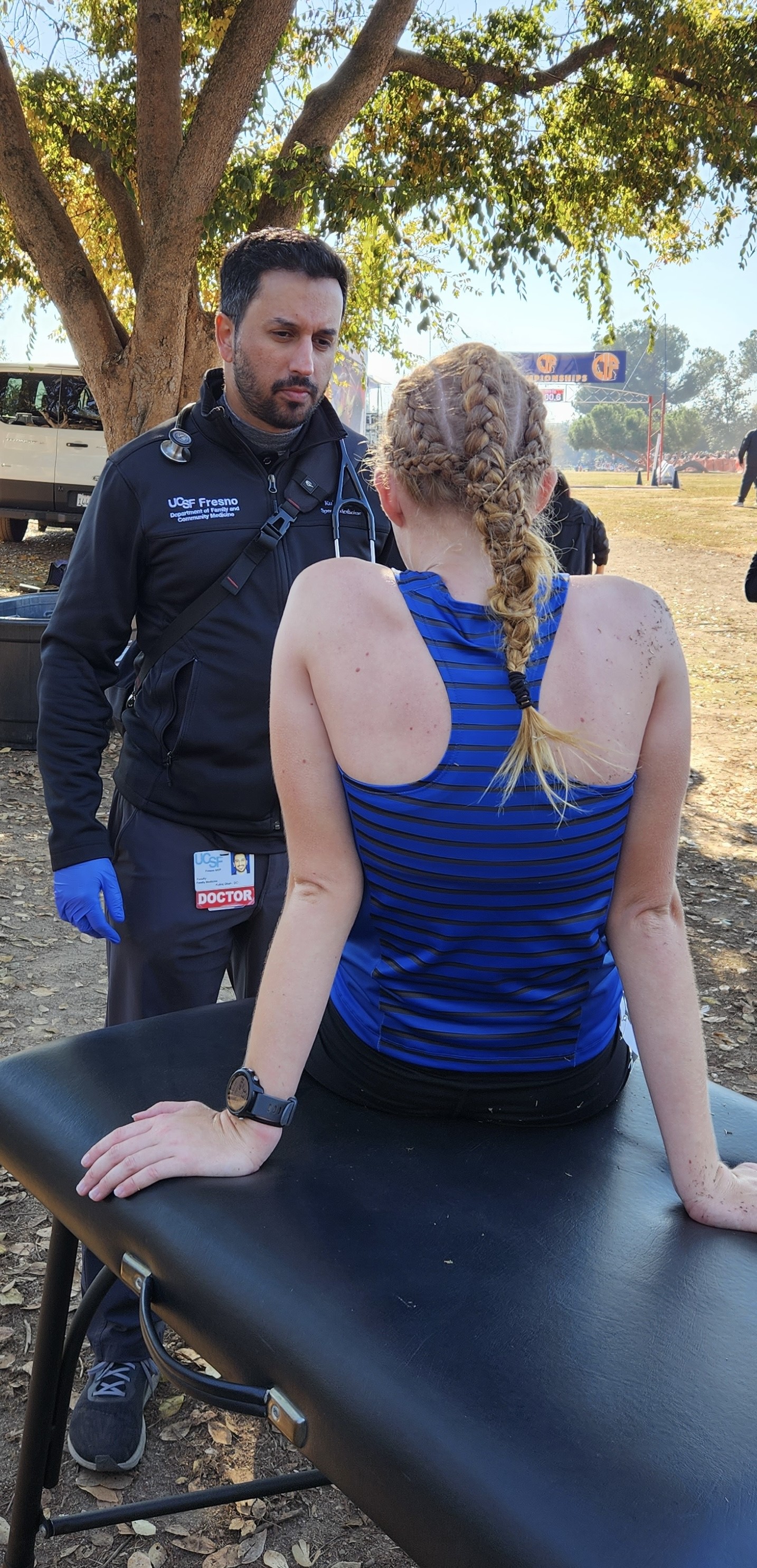
Dr. Dhah provides free sports physicals, including Family and Community Medicine residents in the volunteer service. Without a sports physical, a student athlete cannot play. The physicals are conducted on school campuses, which makes it easier for students who lack transportation to access the free service. “I reached out to the athletic directors for Fresno Unified five years ago and asked if they needed any help with sports medicine coverage, sports physicals throughout the year,” Dr. Dhah says. “They didn’t have anybody at all doing it on a consistent basis at that point. And they were really happy to have us come out there and start working with them.”
During sports physicals, Dr. Dhah says he has learned some students do not have a primary care doctor and are uninsured. “I was a part of that community growing up,” he says. “So, we are doing a lot of advising families to apply for Medi-Cal. We are able to get some of them to sign up and go through the process and get insurance so the students actually can be seen in clinics and hospitals. And if they need more advanced care they can get it, because they have insurance. Without insurance you can’t be referred to a specialist.”
Mar says helping student athletes and their families walk through the process of applying for Medi-Cal is a needed and welcome service. “We live in an impoverished area,” he says. “And a lot of people don’t know there’s a need out there with our students.”
The Sports Medicine Clinics have grown in popularity over the past few years. “We’ve built up the patient volume, so we have three full days of Sports Medicine Clinics
now between Family Health Care Network and United Health Centers,” Dr. Dhah says. Third-year UCSF Fresno Family and Community Medicine residents rotate with Dr. Dhah and see patients at the clinics for their Orthopaedic/Sports Medicine month training block. Second-year residents also can choose the rotation as an elective. UCSF Fresno Pediatrics assigns second-year residents to rotate at the clinics as part of their adolescent rotation.
About the same time that Dr. Dhah began offering free sports physicals at Fresno Unified and began volunteering at McLane High School football games, he was approached by Reedley College for help with medical coverage. “We agreed to start working with them as well. So, I have been the team physician for Reedley College for the past five years. That has been a really good experience, going out there and helping out the students there. It’s all volunteer. What we do for Fresno Unified and for Reedley College, that’s all volunteer for us.”
Mar says Dr. Dhah has helped a lot of student athletes through his volunteerism. “We just are very, very appreciative of his willingness to serve the community and give back.”
Dr. Dhah says it has been a great experience for himself and for UCSF Fresno Family and Community Medicine residents to provide services to student athletes. “It’ just really gratifying to get out in the community a lot more and use our skills directly out there in the community to increase access to medical care.”
In November, during the Fresno Madera Medical Society Installation and Awards Gala, Katherine A. Flores, MD, was accompanied by her cousin and surrounded by fellow physicians when she received a Lifetime Achievement Award for her commitment to her patients and dedication to educate young students about the medical field.
In a video produced by the Fresno Madera Medical Society, Ali Fayed, MD, who has known Dr. Flores for almost 25 years, shared why he nominated her.
“She really feels the responsibility toward the community that she lives in,” Dr. Fayed said. “I think her dedication and commitment to medical education in trying to encourage young Hispanic and non-Hispanic students to pursue a medical career is one of her strongest and most admired commitments.”
Other colleagues remember her as a bright medical student with ambition to accomplish remarkable things. From the moment she became a physician, she made it her mission to serve the underserved community and to create pathways to medical school in hopes of narrowing the gap between the significant percentage of the Latino/a/x population in California's Central Valley and the small number of Latino/a/x medical personnel.
Dr. Flores was born into a family of migrant farm workers in Fresno County, California. Because of the inequities she observed as a child, she made an early decision to make a difference. She attended Roosevelt High School in Fresno, Stanford University, and then attended medical school at UC Davis. For over 40 years, Dr. Flores has worked as a family medicine physician.
Following her Family Medicine Residency at UCSF Fresno, she began her medical career in 1983 as a family physician in private practice. She was appointed to her faculty position at UCSF Fresno and she served as the program director for the statewide California Area Health Education Center and the California Health Education and Training Center. In 1996, Dr. Flores established the Latino Center for Medical Education and Research which operated a variety of programs focused on increasing diversity in health professions in the San Joaquin Valley. In 1999, Dr. Flores, in partnership with UCSF Fresno, Fresno Unified School District and the Fresno County Superintendent of Schools, launched the UCSF Fresno Doctors Academy Program which has now produced hundreds of college graduates and health care professionals.
Through the Doctors Academy, students take part in rigorous accelerated classes that emphasize math, science, and writing, and participate in personal and professional development workshops, academic counseling and support services, parent empowerment workshops, lectures from medical or health practitioners and summer school enrichment programs.
Dr. Flores described health pathway programs as a strategic effort to help young people choose a health career and then receive guidance along the journey with exposure and the tools to be successful. Resources and services include academic enrichment, learning how to study, test taking skills, looking outside academics, and exploring medical professions. Students also gain a deeper understanding and appreciation of the San Joaquin Valley's rich cultural diversity, as well as the importance of culturally and linguistically competent health care and a strong understanding of the social determinants of health and health equity.
“It helps them see a broader picture of health, community and recognizing that as a health professional they will play a role in assuring that not just patients are healthy but also the community,” Dr. Flores said.
Over the years, she has helped create a robust mix of pathway programs to support students and families through middle school, high school, college and into health professional school while continuing to support them through the UCSF San Joaquin Valley Program in Medical Education (SJV PRIME) and residency training.
The recent lifetime achievement award was added to the multiple awards and recognitions she has received over nearly four decades.
In October, Peter Chin-Hong, MD, UCSF Associate Dean for Regional Campuses, and Kenny Banh, MD, Assistant Dean of Undergraduate Medical Education at UCSF
Fresno, announced the establishment of the Katherine A. Flores, MD, Health Pathway Champion Award during a town hall with Dean Talmadge E. King, Jr., MD, UCSF School of Medicine.
Emy López Phillips, director of the UCSF Fresno Office of Health Career Pathways, said the award was established to acknowledge the efforts of faculty, learners and staff who have supported pathway programs at the UCSF Fresno Regional Campus and will recognize the outstanding efforts of individuals who work tirelessly toward the development of health pathway programming and educational outreach in the San Joaquin Valley.
Recognizing the people who do this work is important as they play a pivotal role in diversifying the physician pipeline within the San Joaquin Valley,” López Phillips said.
All UCSF Fresno employees and students are eligible to win the award. The first recipient will be awarded in the Fall of 2024.
Sitting among staff, Dr. Flores was surprised, honored and humbled to learn about the establishment of the Health Pathway Champion Award under her name – a fitting award and legacy for a doctor who has worked tirelessly to forge a path for students, especially those from disadvantaged backgrounds like her, who aspire to become physicians and give back to their communities.
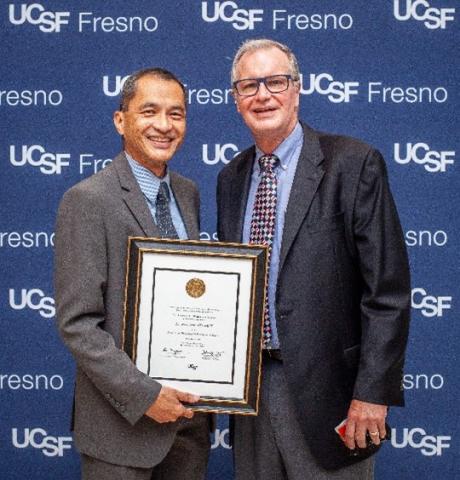

When donors make a gift to UCSF Fresno, they have a choice: give to a current-use fund where their gift is fully expended with immediate impact or give to an endowed fund that will make a difference in perpetuity. Endowments provide both immediate and lasting benefits for our UCSF Fresno community and are critical to all great institutions in providing a reliable source of funding for our premier programs and talent.
Thanks to generous donors, we recently celebrated the culmination of two endowments that provide a steady stream of resources that will support the important work of the UCSF Fresno Department of Surgery in perpetuity. Both endowed funds allow the department to address priorities in teaching, research and patient care to continue providing UCSF Fresno trainees with a world-class clinical general surgery education that prepares them for successful careers in private practice and further training in competitive surgical fellowships.
In October 2023, family, friends and colleagues gathered at UCSF Fresno to celebrate the establishment of the James W. and Amy Davis Endowed Chair in Trauma honoring Lawrence Sue, MD, FACS, chief of the Division of Trauma at UCSF Fresno and UCSF clinical professor. The chair was established with an initial gift from James Davis, MD, and wife Amy Davis, BSN, and will support Dr. Sue’s work which focuses on general surgery, trauma, surgical critical care, medical education, trauma prevention, laparoscopy, tactical medicine and pre-hospital trauma care.
The Narayana Ambati, MD, and Rama Ambati Endowment in Urology honors Narayana Ambati, MD, a nationally recognized practitioner, researcher, educator, author, and speaker in the field of Urology and his wife Rama. Since he joined UCSF Fresno as clinical professor of Urology in 1986, Dr. Ambati has generously shared his passion and skill by training and mentoring future generations of local medical providers and surgeons as a leader in the UCSF Fresno Department of Surgery Residency Program. The endowment’s impact will be far reaching, making it possible for the department to host lectures featuring preeminent subject matter experts in Urology and deliver an exceptional education to UCSF Fresno physician trainees.
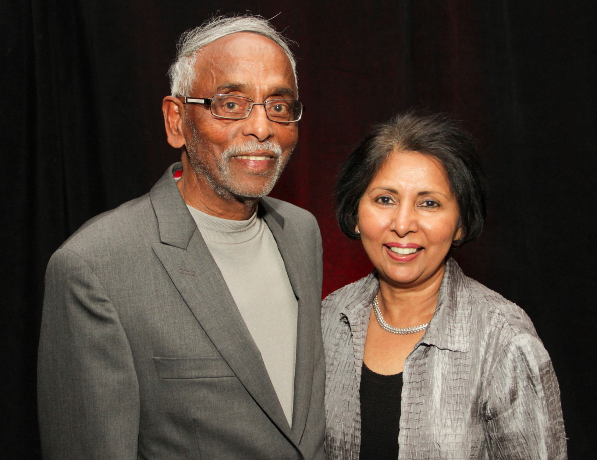
Each year, individual endowment funds are wisely and strategically invested by the UCSF Foundation. A percentage of the total endowment value is used to fund the donor’s intended purpose, whether it be a scholarship, program, research or any number of other worthy causes. These gifts live on in perpetuity, allowing donors to support their areas of passion long after the initial gift.
The importance of helping to build a strong foundation of endowments cannot be overstated. Endowments enable UCSF Fresno to recruit and retain a distinguished faculty, attract the best and brightest students, residents and fellows, perform groundbreaking research and provide the best in clinical care to San Joaquin Valley communities and beyond.
An endowed gift can make an enormous difference for our students, trainees, faculty members, educational programs, research and the future of UCSF Fresno. It’s a gift that keeps on giving forever. To learn more about the different types of endowed funds available at UCSF and other giving options, please contact Kathleen Smith, associate director of Development for UCSF Fresno at (559) 499-6426 or [email protected]
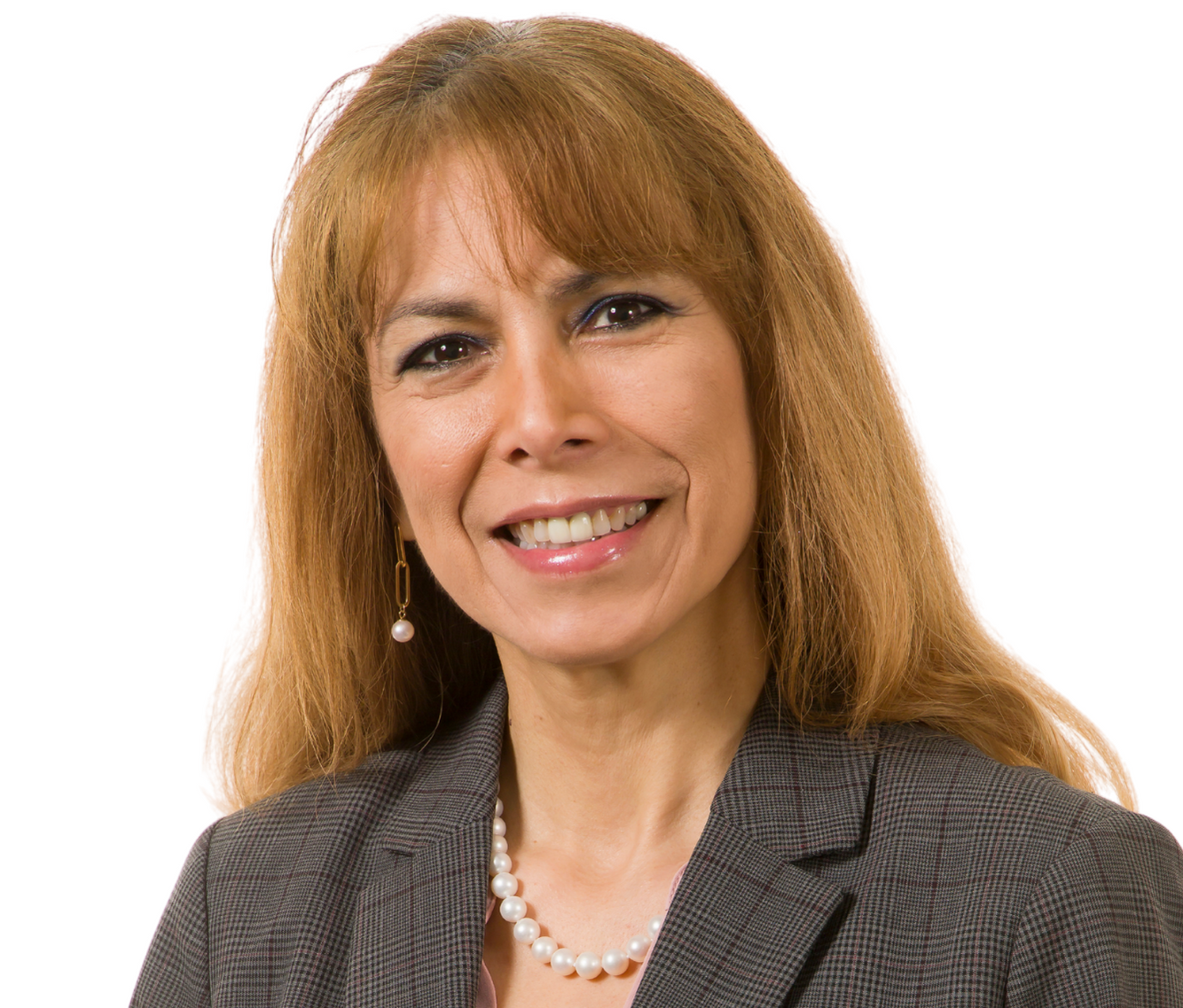
Kudos to Lourdes DelRosso, MD, and team Rijesh Niraula, DO; Amitoj Singh; Sanket Meghpara, MD; and Lynn Keenan, MD; on the publication of “Age matters: association between age and depression severity at the time of OSA diagnosis, and PAP adherence in adult patients,” in the Journal of Clinical Medicine.
Kudos to Angela Allison, who was promoted to Supervisor in the UCSF Fresno Office of Health Career Pathways effective Nov. 20, 2023. The OHCP was established to improve efficiencies among the important work of health pathway programs within UCSF Fresno. Angela will directly supervise the team that coordinates Pre-College Pathways within OHCP like the Doctors Academy, Junior Doctors Academy and other K-12 programming.

Congrats to UCSF Fresno’s Victoria Green, MD; Joanne Lin, DO; and Marina Roytman, MD, and colleagues at Community Regional Medical Center and Fresno Heart & Surgical Hospital Morgan McGrath, MAS; Aaron Lloyd, MPH; Pearl Ma, MD; and Kelvin Higa, MD, on the publication of “FIB-4 Reliability in Patients With Severe Obesity Lower Cutoffs Needed?” in the Journal of Clinical Gastroenterology.
Congratulations to Danielle Campagne, MD, FACEP, who was named Chief of Emergency Medicine at UCSF Fresno and Vice Chair of Emergency Medicine at the UCSF School of Medicine. Dr. Campagne adeptly served as Interim Chief of Emergency Medicine since August 2022. Her appointment as Chief was effective Oct. 16, 2023. Dr. Campagne, Professor in Clinical Emergency Medicine, is a Sanger Native. Prior to becoming Interim Chief, she served as Vice Chief of the UCSF Fresno Department of Emergency Medicine. She joined UCSF Fresno as a Health Sciences Clinical Instructor in Emergency Medicine in 2008. She became an Assistant Health Sciences Clinical Professor in 2010 and an Associate Professor in 2016. She was named Vice Chief in 2017. In addition, Dr. Campagne was the Program Director of the UCSF Fresno Department of Emergency Medicine Wilderness Medicine Fellowship from 2013-2015 and has served as medical director for both American Ambulance and the Department of Emergency Medicine’s Physician Assistant Residency Program since 2019 and 2018, respectively.


